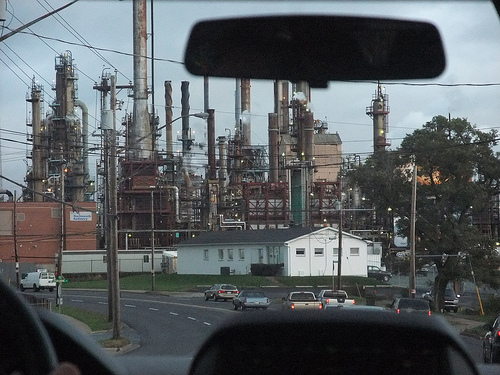In Saint John New Brunswick, Mr. Harper exclaimed that with TransCanada’s proposed Energy East Pipeline, “We’re not just expanding our markets for our energy projects … We are also at the same time making sure that Canadians themselves benefit from those projects and from that gain energy security.”
Instead of always promising energy security to the United States, it’s refreshing to finally hear Mr. Harper talk about energy security for Canadians. This country is vulnerable to the next international oil supply crisis because it still imports almost half the oil Canadians use.
Atlantic Canadians are particularly exposed, depending on imports for more than 80 per cent of their oil from dodgy sources like Algeria, Saudi Arabia and Angola, to heat their homes and fuel their cars through long icy winters.
Would TransCanada’s Energy-East oil pipeline finally give Atlantic Canadians the energy security they need? Not necessarily. TransCanada is teaming up with Irving Oil to build an ice-free, deepwater port in Saint John to receive the world’s largest oil tankers and export Western Canadian oil to the globe’s most lucrative markets.
East coast consumers would love to get cheaper western oil, but Alberta’s tar sands oil producers have the opposite intent. They want to reach tidewater to get the world oil price. It is clear that the oil on TransCanada’s proposed line would go to the highest bidder and that Ottawa will not determine that it must meet all of Atlantic Canadians oil needs before allowing exports.
But do Atlantic Canadians really need to pipe in oil all the way from far off Alberta when Newfoundland’s offshore oil fields produce just under 200,000 barrels of oil a day, enough to meet all the oil used in the four Atlantic provinces? It may make corporate sense. Does it make common sense?
Wouldn’t east coasters be most energy secure if they relied totally on their own oil?
Absurdly, Newfoundlanders don’t get the oil they produce. The majority of it is exported and the U.S. gets first access to it through NAFTA’s proportionality clause.
The clause was crafted to serve the interests of big, mainly foreign petro corporations in exporting as much Canadian oil and natural gas to the US as possible. It was written before the end of the age of cheap oil and before we realized the coming catastrophe of climate change.
But Mr. Obama’s temporary halting of TransCanada’s proposed Keystone XL pipeline broke the bargain that underlay NAFTA — guarantee the access of Canadian energy exports to the U.S. in return for U.S. first access to Canada’s energy resources. It’s clear that the U.S. can block Canadian energy exports at will. Why should we continue to give the U.S. unlimited access to our energy when that blocks Canadians from gaining energy security by relying on their own oil?
NAFTA’s proportionality clause was never in Canadians interest, only in corporate oil’s interest.
If Washington attempts to use NAFTA to stop Atlantic Canadians from getting first access to their own oil, Canada can give six months notice to end NAFTA, as Barack Obama and Hilary Clinton threatened to do in the 2008 Democratic party primaries.
Canada needs to supply Canadians with their own oil, so that when this country gets serious about weaning Canadians off their very wasteful use of oil, Canada’s oil production would fall at the same rate. We can’t control how much carbon energy other countries burn and waste, but we can control how much we do.
Most Atlantic Canadians live on a coast or near one. There is no need for a pipeline to bring most of them oil when it can be shipped in. Why build a pipeline then with its risks of spills and invasions of First Nations lands?
Tankers must be double hulled and are safer than oil pipelines. Tankers can be phased out as east coasters’ oil use falls, whereas a pipeline will demand Sands oil to fill it for half a century.
Newfoundland oil for the region would follow the underwater cable bringing Labrador’s electric power to Nova Scotia and help knit stronger ties among Atlantic Canadians.
Russ Girling, CEO of TransCanada Pipelines, rhetorically calls his proposed Energy East line a nation building project like the Canadian Pacific Railway and the TransCanada Highway. It is no such thing. It is merely an Alberta Sands oil exporting line for transnational oil corporations dressed up in nationalist clothing.
The long-term solution for energy security is to phase out oil’s use and rely instead on electricity produced by renewables. Use Newfoundland’s declining oil output to transition the four provinces to a low carbon society. Refuse to be an export outlet for Sands oil that spews carbon into humanity’s common atmosphere and fouls the landscape wherever it flows.
If Mr. Harper really cares about Atlantic Canadians’ energy security, he would say yes to Atlantic oil for Atlantic Canadians and no to a spill-prone oil pipeline from Quebec to Saint John.
Gordon Laxer is a political economist and the founding director and former head of Parkland Institute at the University of Alberta.
This article was originally published in the Saint John Telegraph-Journal and is reprinted here with permission.
Photo: Thox / flickr



